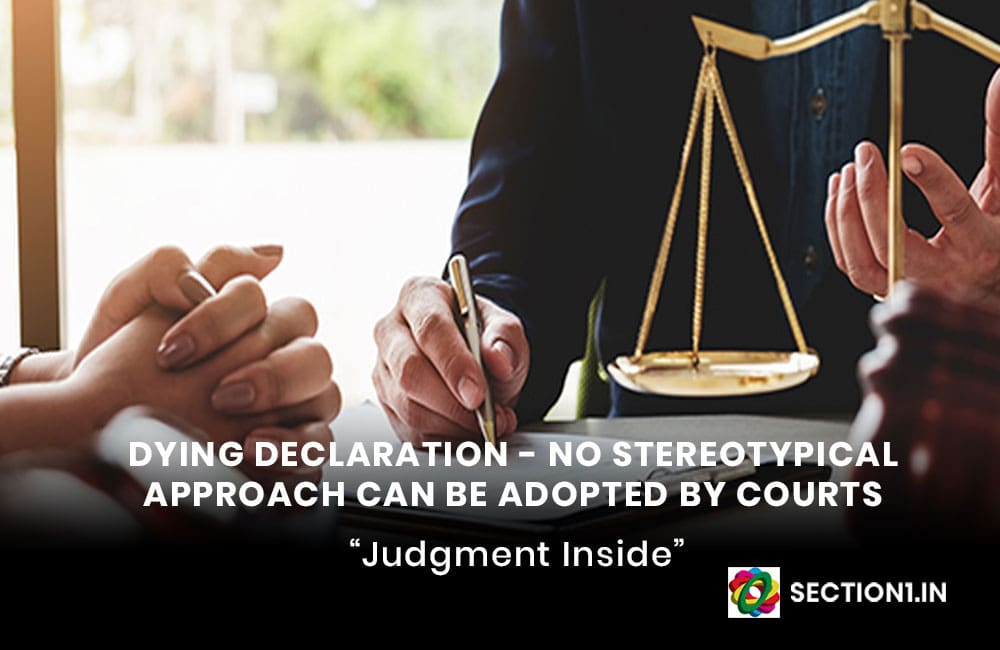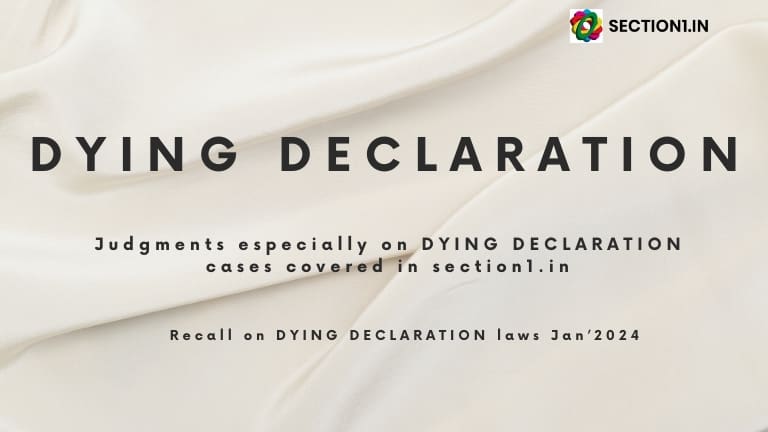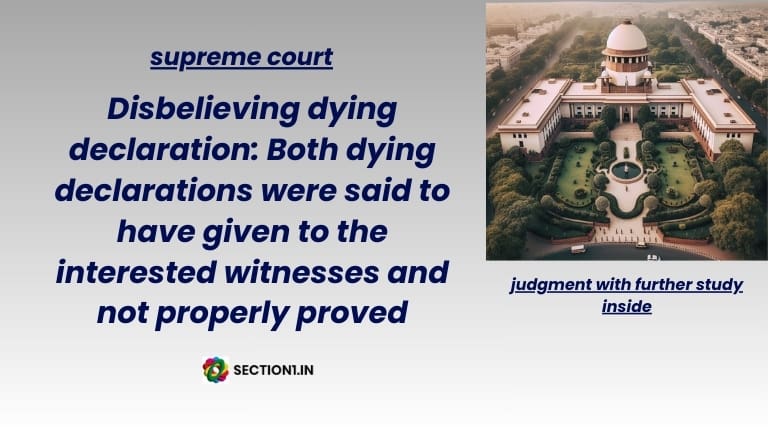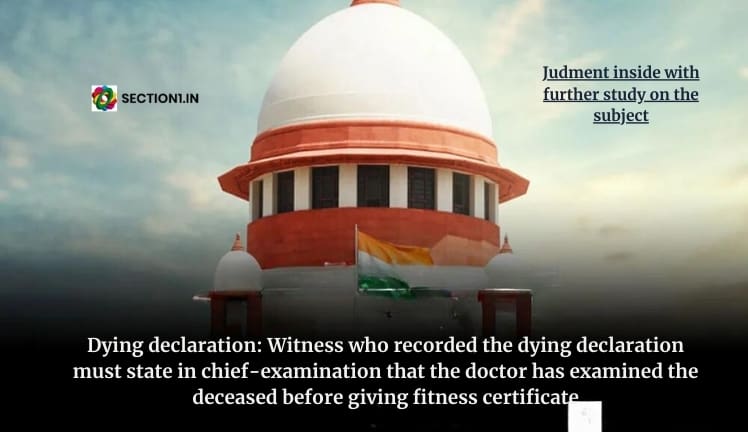13. Section 32 of the Evidence Act, which is material for the purposes of this appeal, reads as under:
“32. Cases in which statement of relevant fact by person who is dead or cannot be found, etc., is relevant. — Statements, written or verbal, of relevant facts made by a person who is dead, or who cannot be found, or who has become incapable of giving evidence, or whose attendance cannot be procured without an amount of delay or expense which under the circumstances of the case appears to the Court unreasonable, are themselves relevant facts in the following cases: —
(1) When it relates to cause of death. –When the statement is made by a person as to the cause of his death, or as to any of the circumstances of the transaction which resulted in his death, in cases in which the cause of that person’s death comes into question.
Such statements are relevant whether the person who made them was or was not, at the time when they were made, under expectation of death, and whatever may be the nature of the proceeding in which the cause of his death comes into question.
(2) Or is made in course of business.–When the statement was made by such person in the ordinary course of business, and in particular when it consists of any entry or memorandum made by him in books kept in the ordinary course of business, or in the discharge of professional duty; or of an acknowledgment written or signed by him of the receipt of money, goods, securities or property of any kind; or of a document used in commerce written or signed by him; or of the date of a letter or other document usually dated, written or signed by him.
(3) Or against interest of maker.–When the statement is against the pecuniary or proprietary interest of the person making it, or when, if true, it would expose him or would have exposed him to a criminal prosecution or to a suit for damages.
(4) Or gives opinion as to public right or custom, or matters of general interest.–When the statement gives the opinion of any such person, as to the existence of any public right or custom or matter of public or general interest, of the existence of which, if it existed, he would have been likely to be aware, and when such statement was made before any controversy as to such right, custom or matter had arisen.
(5) Or relates to existence of relationship.–When the statement relates to the existence of any relationship [by blood, marriage or adoption] between persons as to whose relationship [by blood, marriage or adoption] the person making the statement had special means of knowledge, and when the statement was made before the question in dispute was raised.
(6) Or is made in will or deed relating to family affairs. –When the statement relates to the existence of any relationship [by blood, marriage or adoption] between persons deceased, and is made in any will or deed relating to the affairs of the family to which any such deceased person belonged, or in any family pedigree, or upon any tombstone, family portrait or other thing on which such statements are usually made, and when such statement was made before the question in dispute was raised.
(7) Or in document relating to transaction mentioned in Section 13, clause (a).–When the statement is contained in any deed, will or other document which relates to any such transaction as is mentioned in Section 13, clause (a).
(8) Or is made by several persons and expresses feelings relevant to matter in question.–When the statement was made by a number of persons, and expressed feelings or impressions on their part relevant to the matter in question.”
14. This court has considered the above provision in numerous decisions and held that the weight and utility of a dying declaration depend upon the surrounding circumstances and the credibility which the court attaches to it, having regard to the evidence led before it. Therefore, whether it is essential to have medical certification before the statement is recorded, who records it, etc. are all fact dependent, and no stereotypical approach can be adopted by courts. In Laxman vs. State of Maharashtra [2002 (SUPP1) SCR 697]a five-member Bench of this court explained the position, in law, as follows:
“A dying declaration can be oral or in writing and in any adequate method of communication whether by words or by signs or otherwise will suffice provided the indication is positive and definite. In most cases, however, such statements are made orally before death ensues and is reduced to writing by someone like a magistrate or a doctor or a police officer. When it is recorded, no oath is necessary nor is the presence of a magistrate is absolutely necessary, although to assure authenticity it is usual to call a magistrate, if available for recording the statement of a man about to die. There is no requirement of law that a dying declaration must necessarily be made to a magistrate and when such statement is recorded by a magistrate there is no specified statutory form for such recording. Consequently, what evidential value or weight has to be attached to such statement necessarily depends on the facts and circumstances of each particular case. What is essentially required is that the person who records a dying declaration must be satisfied that the deceased was in a fit state of mind.
Where it is proved by the testimony of the magistrate that the declarant was fit to make the statement even without examination by the doctor the declaration can be acted upon provided the court ultimately holds the same to be voluntary and truthful. A certification by the doctor is essentially a rule of caution and therefore the voluntary and truthful nature of the declaration can be established”.
xxx
19. The principles enunciated by the decision of this court, especially Laxman and the decisions dealing with multiple dying declarations, adduced in the course of a criminal trial, especially where the deceased had been a victim of burns and had succumbed to burn injuries and had prior to death made more than one dying declaration have indicated that test of credibility having regard to the overall facts on record, has to be adopted.
20. This court notices that the present is a case where the second dying declaration has been rejected completely by the High Court. In these circumstances, the cumulative weight of evidence relied upon by the High Court needs to be examined to ascertain whether the appellant is guilty of the offence he stands convicted for, i.e., Section 498A IPC. Ex. P-26, the second dying declaration is the only piece of evidence which names the appellant as one of the perpetrators of cruelty on the deceased along with the other accused. Both the courts below have noticed that in Ex. P-11, the first dying declaration, the appellant has not been named; rather he along with his father took the deceased in a critically injured state to the hospital. Undoubtedly, the focus of the first dying declaration is only upon the incident involving pouring of kerosene and setting the deceased on fire. The second dying declaration, Ex. P-26 alone elaborates acts of cruelty. That is the only piece of incriminating evidence against the accused. As far as the recovery of articles and the smell of kerosene in the report considered by the court are concerned, they are circumstances relating to the incident of setting the deceased on fire. They do not further the prosecution’s case under Section 498A as against the appellant.
21. Having regard to the above circumstances, especially the fact that the only evidence against the appellant, i.e., Ex. P-26 was discredited by the High Court, there is no other material to sustain his conviction. For these reasons, the impugned judgment and the appellant’s conviction and sentence are hereby set aside. The appellant shall be released forthwith unless required in some other case. The appeal is allowed but without any order as to costs.
PARTY: RAJARAM vs. STATE OF MADHYA PRADESH & ORS – CRIMINAL APPEAL NO(S). 2311 OF 2022 [@ SPECIAL LEAVE PETITION (CRL.) NO(S). 6762 of 2022] – December 16, 2022.
Source:Download






